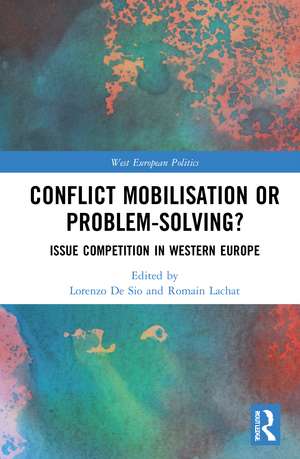Conflict Mobilisation or Problem-Solving?: Issue Competition in Western Europe: West European Politics
Editat de Lorenzo De Sio, Romain Lachaten Limba Engleză Hardback – 19 mai 2021
The contributors to this volume cast a new light on electoral developments that have affected Western Europe in recent years, pointing to the key distinction between problem-solvers (parties and leaders that leverage their technocratic competence, and present a consensual, win-win view of contemporary transformations) and conflict mobilizers (that instead invest on the mobilization of conflict emerging from these transformations), as well as to the ability of some actors to mobilize voters across traditional ideological boundaries. In this light, parties commonly identified as "populist" simply emerge distinctively as cross-ideological conflict mobilizers; but mainstream parties appear vital and competitive as well, when they properly identify and leverage their issue advantages. Thus, the fate of democracy in Western Europe does not appear doomed to a triumph of populist appeals, but rather openly depending on the ability of political parties to leverage issue opportunities that emerge from societal demands and needs.
The chapters in this book were originally published as a special issue of West European Politics.
| Toate formatele și edițiile | Preț | Express |
|---|---|---|
| Paperback (1) | 389.66 lei 6-8 săpt. | |
| Taylor & Francis – 25 sep 2023 | 389.66 lei 6-8 săpt. | |
| Hardback (1) | 1002.50 lei 6-8 săpt. | |
| Taylor & Francis – 19 mai 2021 | 1002.50 lei 6-8 săpt. |
Din seria West European Politics
-
 Preț: 319.16 lei
Preț: 319.16 lei -
 Preț: 258.66 lei
Preț: 258.66 lei -
 Preț: 165.25 lei
Preț: 165.25 lei -
 Preț: 416.22 lei
Preț: 416.22 lei - 16%
 Preț: 264.18 lei
Preț: 264.18 lei -
 Preț: 389.38 lei
Preț: 389.38 lei -
 Preț: 323.23 lei
Preț: 323.23 lei -
 Preț: 389.38 lei
Preț: 389.38 lei -
 Preț: 273.35 lei
Preț: 273.35 lei - 27%
 Preț: 496.97 lei
Preț: 496.97 lei -
 Preț: 416.22 lei
Preț: 416.22 lei -
 Preț: 449.41 lei
Preț: 449.41 lei -
 Preț: 323.23 lei
Preț: 323.23 lei -
 Preț: 416.22 lei
Preț: 416.22 lei - 17%
 Preț: 259.98 lei
Preț: 259.98 lei -
 Preț: 384.59 lei
Preț: 384.59 lei - 16%
 Preț: 260.93 lei
Preț: 260.93 lei - 15%
 Preț: 708.81 lei
Preț: 708.81 lei - 18%
 Preț: 1001.39 lei
Preț: 1001.39 lei - 16%
 Preț: 130.21 lei
Preț: 130.21 lei -
 Preț: 389.66 lei
Preț: 389.66 lei -
 Preț: 449.41 lei
Preț: 449.41 lei - 25%
 Preț: 523.55 lei
Preț: 523.55 lei - 13%
 Preț: 323.91 lei
Preț: 323.91 lei - 17%
 Preț: 259.98 lei
Preț: 259.98 lei - 18%
 Preț: 1056.32 lei
Preț: 1056.32 lei - 26%
 Preț: 764.62 lei
Preț: 764.62 lei -
 Preț: 409.69 lei
Preț: 409.69 lei - 18%
 Preț: 1002.80 lei
Preț: 1002.80 lei - 25%
 Preț: 824.34 lei
Preț: 824.34 lei - 25%
 Preț: 767.20 lei
Preț: 767.20 lei
Preț: 1002.50 lei
Preț vechi: 1222.56 lei
-18% Nou
Puncte Express: 1504
Preț estimativ în valută:
191.82€ • 200.82$ • 158.72£
191.82€ • 200.82$ • 158.72£
Carte tipărită la comandă
Livrare economică 07-21 aprilie
Preluare comenzi: 021 569.72.76
Specificații
ISBN-13: 9780367710828
ISBN-10: 036771082X
Pagini: 254
Dimensiuni: 156 x 234 x 16 mm
Greutate: 0.52 kg
Ediția:1
Editura: Taylor & Francis
Colecția Routledge
Seria West European Politics
Locul publicării:Oxford, United Kingdom
ISBN-10: 036771082X
Pagini: 254
Dimensiuni: 156 x 234 x 16 mm
Greutate: 0.52 kg
Ediția:1
Editura: Taylor & Francis
Colecția Routledge
Seria West European Politics
Locul publicării:Oxford, United Kingdom
Public țintă
Postgraduate and UndergraduateCuprins
Introduction 1. Research design: from issues to goals 2. The 2017 Dutch general election: how small parties campaigned more strategically 3. Campaigning in an unprecedented election: issue competition in the French 2017 presidential election 4. The United Kingdom 2017 election: polarisation in a split issue space 5. It’s no longer the economy, stupid! Issue yield at the 2017 German federal election 6. Parties’ issue strategies on the drawing board: the 2017 Austrian case 7. The 2018 Italian general election: party strategies in a changing political space 8. Ideology, problem-solving, and conflict mobilization 9. The proof of the pudding: issue yield at the ballot box
Notă biografică
Lorenzo De Sio is Full Professor of Political Science at LUISS University, Rome, Italy. He is the Director of the CISE (Italian Centre for Electoral Studies); and the principal investigator of the ICCP (Issue Competition Comparative Project). His current research interests focus on issue dynamics in voting behaviour and party competition.
Romain Lachat is Associate Professor of Political Behaviour at CEVIPOF, the Centre for Political Research, Sciences Po, Paris, France. His research focuses on the comparative analysis of electoral behaviour and on political representation. He is particularly interested in the impact of political institutions and party characteristics on individual-level behaviour.
Romain Lachat is Associate Professor of Political Behaviour at CEVIPOF, the Centre for Political Research, Sciences Po, Paris, France. His research focuses on the comparative analysis of electoral behaviour and on political representation. He is particularly interested in the impact of political institutions and party characteristics on individual-level behaviour.
Descriere
This volume casts a new light on electoral developments that have affected Western Europe in recent years, pointing to the key distinction between problem solvers and conflict mobilizers.
